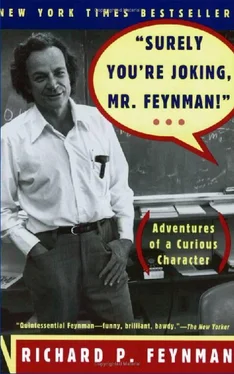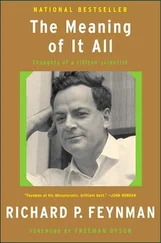A short time before Carnaval, there was going to be a special competition between the samba schools of the beaches—Copacabana, Ipanema, and Leblon; there were three or four schools, and we were one. We were going to march in costume down Avenida Atlantica. I felt a little uncomfortable about marching in one of those fancy Carnaval costumes, since I wasn’t a Brazilian. But we were supposed to be dressed as Greeks, so I figured I’m as good a Greek as they are.
On the day of the competition, I was eating at the hotel restaurant, and the head waiter, who had often seen me tapping on the table when there was samba music playing, came over to me and said, “Mr. Feynman, this evening there’s going to be something you will love! It’s tipico Brasileiro —typical Brazilian: There’s going to be a march of the samba schools right in front of the hotel! And the music is so good—you must hear it.”
I said, “Well, I’m kind of busy tonight. I don’t know if I can make it.”
“Oh! But you’d love it so much! You must not miss it! It’s tipico Brasileiro! ”
He was very insistent, and as I kept telling him I didn’t think I’d be there to see it, he became disappointed.
That evening I put on my old clothes and went down through the basement, as usual. We put on the costumes at the construction lot and began marching down Avenida Atlantica, a hundred Brazilian Greeks in paper costumes, and I was in the back, playing away on the frigideira.
Big crowds were along both sides of the Avenida; everybody was leaning out of the windows, and we were coming up to the Miramar Hotel, where I was staying. People were standing on the tables and chairs, and there were crowds and crowds of people. We were playing along, going like sixty, as our band started to pass in front of the hotel. Suddenly I saw one of the waiters shoot up in the air, pointing with his arm, and through all this noise I can hear him scream, “0 PROFESSOR!” So the head waiter found out why I wasn’t able to be there that evening to see the competition—I was in it!
The next day I saw a lady I knew from meeting her on the beach all the time, who had an apartment overlooking the Avenida. She had some friends over to watch the parade of the samba schools, and when we went by, one of her friends exclaimed, “Listen to that guy play the frigideira — he is good !” I had succeeded. I got a kick out of succeeding at something I wasn’t supposed to be able to do.
When the time came for Carnaval, not very many people from our school showed up. There were some special costumes that were made just for the occasion, but not enough people. Maybe they had the attitude that we couldn’t win against the really big samba schools from the city; I don’t know. I thought we were working day after day, practicing and marching for the Carnaval, but when Carnaval came, a lot of the band didn’t show up, and we didn’t compete very well. Even as we were marching around in the street, some of the band wandered off. Funny result! I never did understand it very well, but maybe the main excitement and fun was trying to win the contest of the beaches, where most people felt their level was. And we did win, by the way.
During that ten-month stay in Brazil I got interested in the energy levels of the lighter nuclei. I worked out all the theory for it in my hotel room, but I wanted to check how the data from the experiments looked. This was new stuff that was being worked out up at the Kellogg Laboratory by the experts at Caltech, so I made contact with them—the timing was all arranged—by ham radio. I found an amateur radio operator in Brazil, and about once a week I’d go over to his house. He’d make contact with the ham radio operator in Pasadena, and then, because there was something slightly illegal about it, he’d give me some call letters and would say, “Now I’ll turn you over to WKWX, who’s sitting next to me and would like to talk to you.”
So I’d say, “This is WKWX. Could you please tell me the spacing between the certain levels in boron we talked about last week,” and so on. I would use the data from the experiments to adjust my constants and check whether I was on the right track.
The first guy went on vacation, but he gave me another amateur radio operator to go to. This second guy was blind and operated his station. They were both very nice, and the contact I had with Caltech by ham radio was very effective and useful to me.
As for the physics itself, I worked out quite a good deal, and it was sensible. It was worked out and verified by other people later. I decided, though, that I had so many parameters that I had to adjust—too much “phenomenological adjustment of constants” to make everything fit—that I couldn’t be sure it was very useful. I wanted a rather deeper understanding of the nuclei, and I was never quite convinced it was very significant, so I never did anything with it.
In regard to education in Brazil, I had a very interesting experience. I was teaching a group of students who would ultimately become teachers, since at that time there were not many opportunities in Brazil for a highly trained person in science. These students had already had many courses, and this was to be their most advanced course in electricity and magnetism—Maxwell’s equations, and so on.
The university was located in various office buildings throughout the city, and the course I taught met in a building which overlooked the bay.
I discovered a very strange phenomenon: I could ask a question, which the students would answer immediately. But the next time I would ask the question—the same subject, and the same question, as far as I could tell—they couldn’t answer it at all! For instance, one time I was talking about polarized light, and I gave them all some strips of polaroid.
Polaroid passes only light whose electric vector is in a certain direction, so I explained how you could tell which way the light is polarized from whether the polaroid is dark or light.
We first took two strips of polaroid and rotated them until they let the most light through. From doing that we could tell that the two strips were now admitting light polarized in the same direction—what passed through one piece of polaroid could also pass through the other. But then I asked them how one could tell the absolute direction of polarization, for a single piece of polaroid.
They hadn’t any idea.
I knew this took a certain amount of ingenuity, so I gave them a hint: “Look at the light reflected from the bay outside.”
Nobody said anything.
Then I said, “Have you ever heard of Brewster’s Angle?”
“Yes, sir! Brewster’s Angle is the angle at which light reflected from a medium with an index of refraction is completely polarized.”
“And which way is the light polarized when it’s reflected?”
“The light is polarized perpendicular to the plane of reflection, sir.” Even now, I have to think about it; they knew it cold! They even knew the tangent of the angle equals the index!
I said, “Well?”
Still nothing. They had just told me that light reflected from a medium with an index, such as the bay outside, was polarized; they had even told me which way it was polarized.
I said, “Look at the bay outside, through the polaroid. Now turn the polaroid.”
“Ooh, it’s polarized!” they said.
After a lot of investigation, I finally figured out that the students had memorized everything, but they didn’t know what anything meant. When they heard “light that is reflected from a medium with an index,” they didn’t know that it meant a material such as water. They didn’t know that the “direction of the light” is the direction in which you see something when you’re looking at it, and so on. Everything was entirely memorized, yet nothing had been translated into meaningful words. So if I asked, “What is Brewster’s Angle?” I’m going into the computer with the right keywords. But if I say, “Look at the water,” nothing happens—they don’t have anything under “Look at the water”!
Читать дальше












